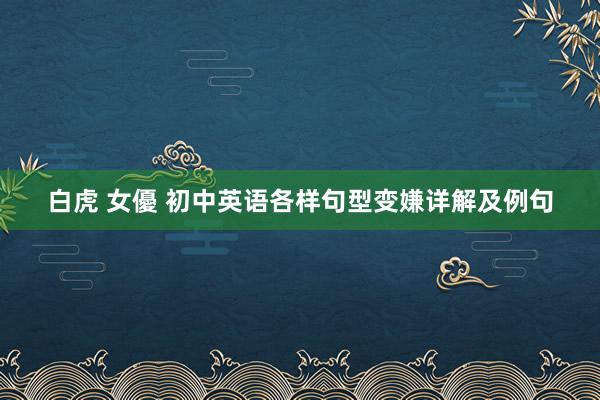
初中英语句型变嫌主要有以下几种类型:白虎 女優
一、论说句变一般疑问句
1. 有 be 动词(am/is/are/was/were)或面貌动词(can/could/may/might/must/should/will/would 等)时,把 be 动词或面貌动词提到句首,句末用问号。举例:
- She is a student. → Is she a student?(她是别称学生。→她是别称学生吗?)
- You can swim. → Can you swim?(你会拍浮。→你会拍浮吗?)
2. 莫得 be 动词和面貌动词时,借助助动词 do/does/did,放在句首,动词变回原形。举例:
- She likes apples. → Does she like apples?(她喜欢苹果。→她喜欢苹果吗?)
- They went to the park yesterday. → Did they go to the park yesterday?(他们昨天去了公园。→他们昨天去了公园吗?)
二、论说句变诡辩句
1. 有 be 动词或面貌动词时,在 be 动词或面貌动词后加 not。举例:
- He is a teacher. → He is not a teacher.(他是别称敦厚。→他不是别称敦厚。)
- I can play basketball. → I can not play basketball.(我会打篮球。→我不会打篮球。)
2. 莫得 be 动词和面貌动词时,借助助动词 don't/doesn't/didn't,放在动词原形前。举例:
- She likes music. → She doesn't like music.(她喜欢音乐。→她不喜欢音乐。)
- We went to school yesterday. → We didn't go to school yesterday.(咱们昨天去了学校。→咱们昨天没去学校。)
三、对划线部分发问
1. 细则疑问词:
- 对东说念主发问用 who(谁);
- 对物发问用 what(什么);
- 对场所发问用 where(那边);
- 对时代发问用 when(什么时候)/what time(几点);白虎 女優
- 对原因发问用 why(为什么);
- 对格式发问用 how(怎样);
- 对数目发问用 how many(若干,可数名词)/how much(若干,不行数名词)。
2. 把原句形成一般疑问句(若是原句中有 be 动词或面貌动词,径直把 be 动词或面貌动词提到句首;若是莫得,借助助动词 do/does/did)。
3. 把疑问词放在句首,后头接一般疑问句。举例:
- She is reading a book.(对 a book 发问)→ What is she reading?(她正在读一册书。→她正在读什么?)
- I go to school by bike.(对 by bike 发问)→ How do you go to school?(我骑自行车去上学。→你怎样去上学?)
四、同义句变嫌
1. 行使同义词或近义词进行变嫌。举例:
- He is very tall. → He is quite tall.(他很高。→他相配高。)
2. 行使不同的句式进行变嫌。举例:
- She is good at English. → She does well in English.(她擅长英语。→她在英语方面作念得好。)
以下是一些例句:
论说句变一般疑问句
1. I am a student. → Are you a student?(我是别称学生。→你是别称学生吗?)
2. They are in the classroom. → Are they in the classroom?(他们在教室里。→他们在教室里吗?)
3. He can play football. → Can he play football?(他会踢足球。→他会踢足球吗?)
4. She must finish her homework. → Must she finish her homework?(她必须完成她的功课。→她必须完成她的功课吗?)
5. You like apples. → Do you like apples?(你喜欢苹果。→你喜欢苹果吗?)
6. We go to school by bus. → Do you go to school by bus?(咱们乘大家汽车去上学。→你们乘大家汽车去上学吗?)
论说句变诡辩句
1. I am a teacher. → I am not a teacher.(我是别称敦厚。→我不是别称敦厚。)
2. They are happy. → They are not happy.(他们很欣喜。→他们不欣喜。)
3. He can swim. → He can not swim.(他会拍浮。→他不会拍浮。)
4. She must go home. → She must not go home.(她必须回家。→她无谓回家。)
5. You like music. → You don't like music.(你喜欢音乐。→你不喜欢音乐。)
6. We go to the park on Sundays. → We don't go to the park on Sundays.(咱们星期天去公园。→咱们星期天不去公园。)
对划线部分发问
1. My name is Tom.(对 Tom 发问)→ What's your name?(我的名字是汤姆。→你叫什么名字?)
2. This is a book.(对 a book 发问)→ What's this?(这是一册书。→这是什么?)
3. I am in the classroom.(对 in the classroom 发问)→ Where are you?(我在教室里。→你在那边?)
4. She goes to school at seven.(对 at seven 发问)→ What time does she go to school?(她七点去上学。→她几点去上学?)
5. He likes apples because they are delicious.(对 because they are delicious 发问)→ Why does he like apples?(他喜欢苹果因为它们很好吃。→他为什么喜欢苹果?)
6. I go to school by bike.(对 by bike 发问)→ How do you go to school?(我骑自行车去上学。→你怎样去上学?)
同义句变嫌
1. He is a clever boy. → He is a smart boy.(他是一个明智的男孩。→他是一个智谋的男孩。)
2. She is very beautiful. → She is extremely beautiful.(她零碎漂亮。→她极其漂亮。)
3. I like swimming. → I enjoy swimming.(我喜欢拍浮。→我可爱拍浮。)
4. He is good at math. → He does well in math.(他擅长数学。→他在数学方面作念得好。)
5. She is a kind girl. → She is a friendly girl.(她是一个祥和的女孩。→她是一个友好的女孩。)
卡通色图6. I have a lot of books. → I have many books.(我有许多书白虎 女優。→我有许多书。)
本站仅提供存储就业,扫数骨子均由用户发布,如发现存害或侵权骨子,请点击举报。